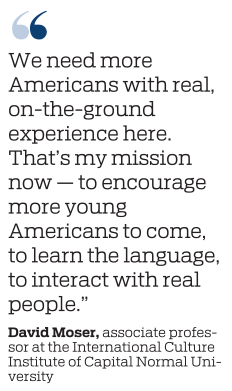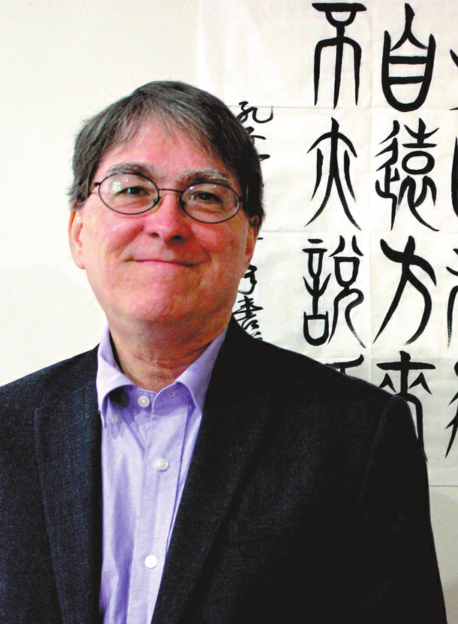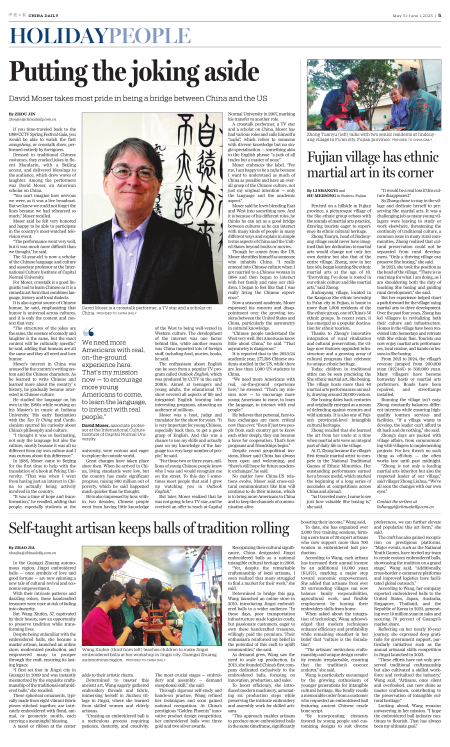

David Moser is a crosstalk performer, a TV star and a scholar on China.
If you time-traveled back to the 1999 CCTV Spring Festival Gala, you would be able to watch the first xiangsheng, or crosstalk show, performed entirely by foreigners.
Dressed in traditional Chinese costumes, they cracked jokes in fluent Mandarin, with a Beijing accent, and delivered blessings to the audience, which drew waves of laughter. Among the performers was David Moser, an American scholar on China.
"You can't imagine how nervous we were, as it was a live broadcast. But we knew we could not forget the lines because we had rehearsed so much," Moser recalled.
Moser said he felt very honored and happy to be able to participate in the country's most-watched television event.
"The performance went very well, but it was much more difficult than we thought," he said.
The 53-year-old is now a scholar of the Chinese language and culture and associate professor at the International Culture Institute of Capital Normal University.
For Moser, crosstalk is a good linguistic tool to learn Chinese as it is a comedic art form that combines language, history and local dialects.
It is also a great source of Chinese humor, he said, emphasizing that humor is universal across cultures, and it is only the content and context that vary.
"The structures of the jokes are the same, the essence of comedy and laughter is the same, but the exact content will be culturally specific," he said, adding that humans are all the same and they all need and love humor.
Moser's interest in China was aroused by the country's writing system and the Chinese characters. As he learned to write Chinese and learned more about the country' s history, he gradually became interested in Chinese culture.
He studied the language on his own in the 1980s while working on his Master's in music at Indiana University. His early fascination with the Tao Te Ching and Confucianism spurred his curiosity about China's philosophy and culture.
"I thought it was so fascinating, not only the language but also the culture, mostly because it was all so different from my own culture and I was curious about this difference."
In 1986, Moser came to Beijing for the first time to help with the translation of a book at Peking University. "That was when I went from having just an interest in China to actually being actively involved in the country.
"It was a time of hope and transformation," he recalled, adding that people, especially students at the university, were curious and eager to explore the outside world.
Great changes have taken place since then. When he arrived in China, living standards were low, but the country has made significant progress, raising 800 million out of poverty, which he said happened much quicker than he thought.
He is also impressed by how, within two decades, Chinese people went from having little knowledge of the West to being well-versed in Western culture. The development of the internet was one factor behind this, while another reason was China imported lots of foreign stuff, including food, movies, books, he said.
The enthusiasm about English can be seen from a popular TV program called Outlook English, which was produced by CCTV in the early 2000s. Aimed at teenagers and young adults, the educational TV show covered all aspects of life and integrated English learning into interesting programs, attracting an audience of millions.
Moser was a host, judge and translator for the show for years. "It is very important for young Chinese, especially back then, to get a good grasp of English. And this was a chance to use my skills and actually pass on my knowledge of the language to a very large number of people," he said.
"For those two or three years, millions of young Chinese people knew who I was and would recognize me on the street. To this day I sometimes meet people that said I grew up watching you in Outlook English."
But later, Moser realized that he was not going to be a TV star, and he received an offer to teach at Capital Normal University in 2007, marking his transfer to another role.
A crosstalk performer, a TV star and a scholar on China, Moser has had various roles and calls himself a "zajia", which refers to someone with diverse knowledge but no single specialization — something akin to the English phrase "a jack of all trades but a master of none".
Moser embraces the label. "For me, I am happy to be a zajia because I want to understand as much of China as possible and have an overall grasp of the Chinese culture, not just my original intention — only the language and the academic aspect."
Moser said he loves blending East and West into something new. And it is because of his different roles, he thinks he can act as a good bridge between cultures as he can interact with many kinds of people in many different ways and explain in simple terms aspects of China and the United States beyond books or movies.
Though he comes from the US, Moser identifies himself as someone who inhabits China. "I really entered into Chinese culture when I got married to a Chinese woman in 1994 and then began to interact with her family and raise our children. I began to feel like that I was really living the Chinese experience."
Now a seasoned academic, Moser expressed his concern and disappointment over the growing tensions between the United States and China, particularly the asymmetry in cultural knowledge.
"Chinese people understand the West very well. But Americans know little about China," he said. "That asymmetry is dangerous."
It is reported that in the 2023/24 academic year, 277,398 Chinese students studied in the US, while there are less than 1,000 US students in China.
"We need more Americans with real, on-the-ground experience here," he stressed. "That's my mission now — to encourage more young Americans to come, to learn the language, to interact with real people."
He believes that personal, face-to-face exchanges are more critical now than ever. "Even if just two people from each country get to know each other deeply, they can become a force for cooperation. That's how programs and friendships begin."
Despite recent geopolitical tensions, Moser said China has always been open and welcoming, and "there's still hope for future academic exchanges", he said.
No matter how China-US relations evolve, Moser said cross-cultural communicators like him will continue to do their mission, which is to bring more Americans to China and to keep the channels of communication alive.
zhoujin@chinadaily.com.cn

